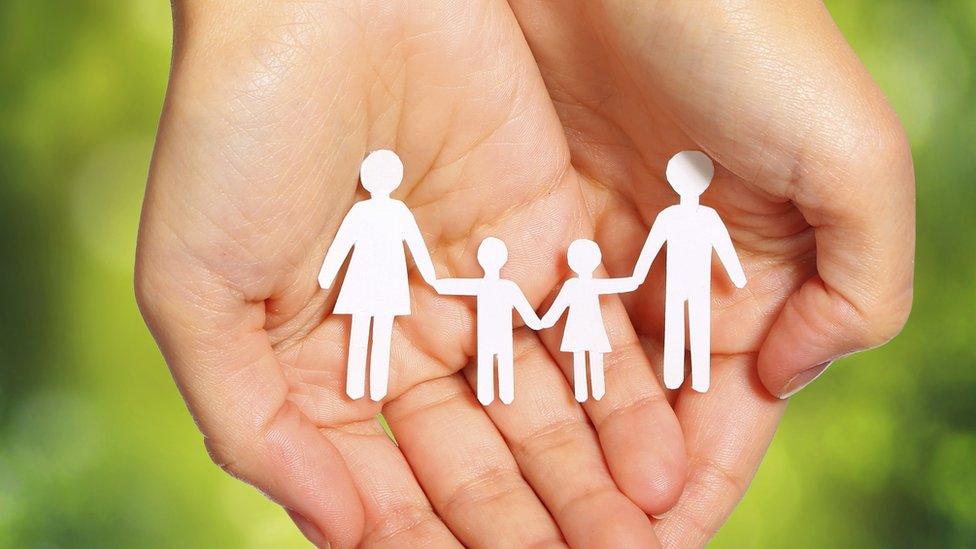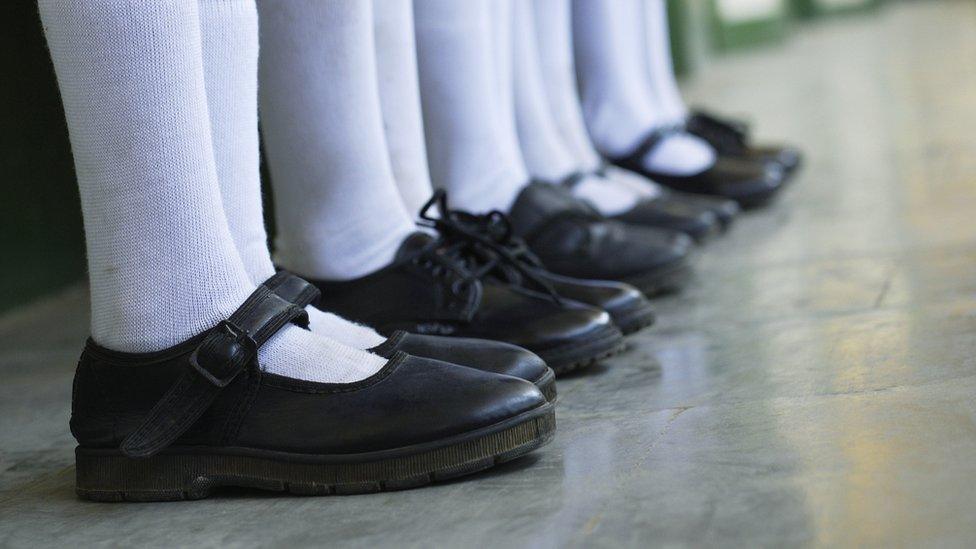What is the named person scheme?
- Published

The Scottish government wants to appoint a "named person" to monitor the welfare of every child in Scotland.
The scheme was due to have been rolled-out across Scotland by 31 August 2016 - but that timetable was delayed after the Supreme Court ruled that some of the proposals around information sharing breached the right to privacy and a family life under the European Convention on Human Rights.
The Scottish government has vowed to amend the legislation, and hopes to have it introduced by August of this year.
Opponents of the scheme had been attempting to have it quashed by the law courts, arguing that the legislation amounts to a "Big Brother" scheme that will undermine parents, breach privacy and divert resources away from children who are genuinely vulnerable.
But many children's charities say named person will help ensure more cases of child abuse and neglect are uncovered and dealt with.
So what is the named person scheme, and why is it so controversial?

Why does the Scottish government want to introduce named person?

Every child in Scotland will have a named person from birth until they are at least 18 years old
The Scottish government wants Scotland to be "the best place in the world for children to grow up".
It has said that most children and young people get all the help and support they need from their parents, wider family and community, but sometimes they might need a bit of extra support.
As part of its Getting it Right for Every Child strategy, the government proposed giving all children and young people from birth to 18 years access to a named person under the Children and Young People (Scotland) Act 2014.
The law had been due to come into force across the country on 31 August of last year but the policy had already been rolled out in parts of Scotland, including Highland, Edinburgh, Fife, Angus and South Ayrshire.
The Scottish government says the named person is intended to be single point of contact if a child or their parents want information or advice, or if they want to talk about any worries and seek support.
They would also be a point of contact for other services if they have any concerns about a child's wellbeing.

Who would be a named person?

In most cases, a child's named person will be their head teacher, deputy head teacher or guidance teacher
In the vast majority of cases, the named person would be a midwife, health visitor, head teacher, deputy head teacher or guidance teacher, depending on the age of the child.
Other organisations, such as independent or grant-aided schools and the Scottish Prison Service (for young people held in custody), will also have a legal requirement to make a named person available to the children and young people in their care.
The Scottish government says that children and families are likely to see little difference, with the legislation merely formalising the role that these professionals already have.

What would a named person do?

A named person will be responsible for acting as an "early warning system" to ensure children are protected
According to the Scottish government, external, the named person would be available to "listen, advise and help a child or young person and their family".
They would also provide direct support and help the child and their family access other services, for example speech and language therapists or bereavement counselling services.
The named person would also be responsible for helping families to address any concerns as early as possible in order to prevent them becoming more serious.
But the government has stressed that the named person would only offer advice or support in response to a request from a child or parent, or when "wellbeing needs are identified".
Other organisations or professionals such as a GP would share information with the named person if they believe it is likely to help safeguard the child's welfare.
This would be done in discussion with the child and their parents, unless there was a child protection concern.
The new law sets out the steps for professionals to follow to make sure the right information is shared at the right time to support the wellbeing of the child where concerns arise or a need has been identified.

What concerns do its opponents have?

Campaigners fear the scheme will cause unnecessary intrusion into family life
The No To Named Persons campaign group has described named person as "the most calamitous scheme the Scottish government has ever dreamed up".
The group is comprised of organisations such as the Christian Institute, Family Education Trust, The Young ME Sufferers ("Tymes") Trust and Care (Christian Action Research and Education).
It lists ten concerns on its website, external, including:
Named person undermines parents and permits the state unlimited access to pry into the privacy of families in their homes.
It will stretch resources for protecting vulnerable children even further by creating a scheme that applies to all children regardless of need.
Named persons will have power to access confidential data on the family, and to talk to a child without their parents agreeing with what they say.
Because of the pressures on them, named persons will be forced to act defensively, reporting "trivial or irrelevant family issues to social services", which will create more work for social services.
Responsibility for monitoring a child's wellbeing should be the role of the parent, not the state.
The group has claimed the legislation breaches European Human Rights laws, and appealed to the Supreme Court in London after having its case thrown out by the Court of Session in Edinburgh last year.
A panel of three judges at the Court of Session had ruled that named persons have "no effect whatsoever on the legal, moral or social relationships within the family".
The judges added: "The assertion to the contrary, without any supporting basis, has the appearance of hyperbole."
But the Supreme Court later ruled that some parts of the legislation do breach rights to privacy and a family life under the European Convention on Human Rights.
However, the judges also said that the aims of the Act were "unquestionably legitimate and benign".
Named person has been strongly criticised by the Conservatives, who have called for it to be scrapped, while Labour does not want 16 and 17 year olds included in the legislation.
Some organisations have warned that the legislation's wording meant the role of the named person was open to wide interpretation.
And the Scottish Parent Teacher Council published the results of an online survey in 2013, external which it said suggested "high levels of concern" from parents about the proposals.

What do supporters of named person say?

Supporters believe the named person scheme will make it easier for parents to get help for children with disabilities
Major children's charities including Barnardo's, Aberlour, Action for Children and Children 1st have accused opponents of the scheme of making "inaccurate and unjustified" statements about named person.
In a joint statement, external, the four charities said a named person would help to connect families more effectively to a range of services when they are needed without "excessive red tape or delay".
And they said the named person would be somebody that the family already knows and would be happy to approach.
Supporters have also pointed to the "great success" of a pilot scheme in the Highlands, which Barnardo's said had helped ensure that children get the help they need, when they need it.
Barnardo's has also said that "giving a health visitor or teacher formal responsibility for collating information is a key part of the early warning system we need to make sure every child in Scotland is protected."
Supporters have also pointed out that the named person would not be a new person in a child's life, but would merely give a stronger role to an existing member of staff.
Alistair Gaw, the president of Social Work Scotland has said, external that named persons would be most effective in situations such as helping parents co-ordinate services for a child with a disability, or getting help or a diagnosis for a child who is struggling to learn.